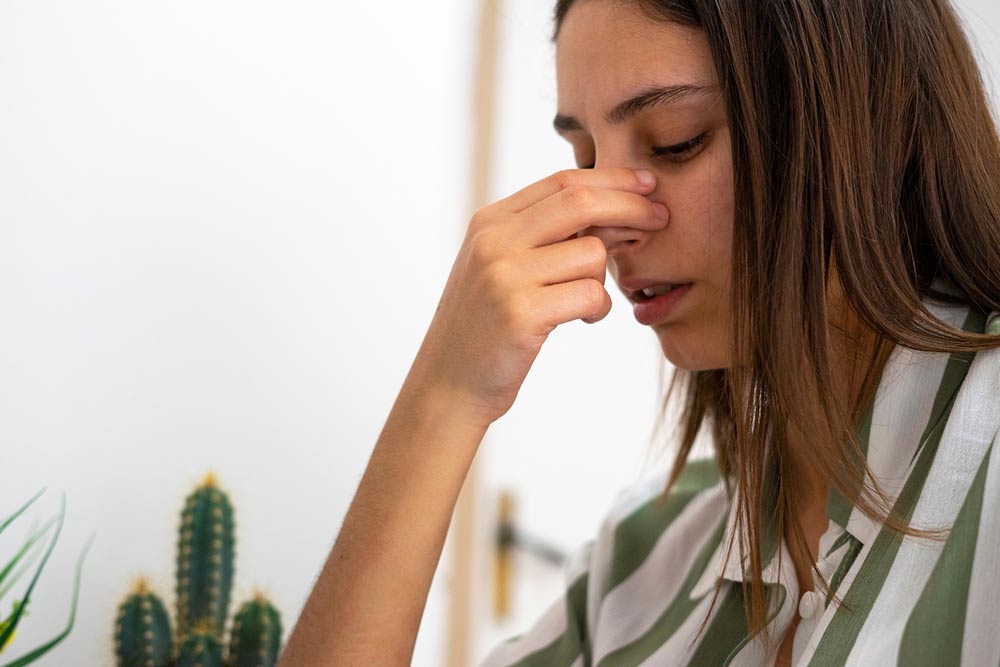6 common symptoms of nasal polyps

Nasal polyps are benign growths that develop on the inner lining of nasal cavities. Some causative agents of nasal polyps include allergies, repeated sinus infections, and asthma. Although polyps are generally painless, as they grow, the patient may start noticing symptoms and pain. It is important to note that the signs and symptoms of nasal polyps do not resolve on their own and may require medical attention. Additionally, if ignored, nasal polyps may lead to complications.
Nasal congestion
People with nasal polyps may experience a blocked nose. This can be attributed to the increase in size of the polyps and the resultant inflammation of the blood vessels. It can also cause swelling of the tissues of the nasal lining and the blood vessels in the septum. The swelling can cause severe congestion and uneasiness for the patients. Because of the stuffiness, patients might even find it difficult to breathe, leading them to breathe through the mouth. Therefore, prolonged nasal congestion can be considered a common symptom of nasal polyps.
Decreased sense of smell
Another common symptom of nasal polyps is the possibility of losing the sense of smell. The polyps inside the nasal cavity cause inflammation and blockage. It also lowers the airflow in the nasal passage. When the patients try to smell, the blockage can prevent the air from reaching the receptors in the nose. Polyps can impact a person’s ability to smell, taste, and detect odors. This is because the senses of taste and smell are interconnected at the back of the throat. Therefore, the presence of nasal polyps can keep patients from fully detecting and relishing the taste of their food.
Snoring
Snoring is another condition that can be caused by nasal polyps. However, it can delay the diagnosis of the patient since snoring can also be caused by various conditions, and it might not be the first thing the doctor thinks of when one comes in with the complaint. When the polyps block the nose, it can leave little or no room for proper airflow, leading the patient to breathe through their mouth. As the air passes through the mouth, it can hit the tissues at the back of the throat, causing them to vibrate and produce snores. The type of noise can also indicate the extent of blockage present in the nose. With bigger polyps, patients may experience hoarse vibrations while sleeping.
Headache
Headaches can be another warning sign of the presence of nasal polyps. It may be present with or without other symptoms like sinus pains and increased facial pressure. Headaches are fairly common in people who develop chronic sinus infections because of the presence of nasal polyps. It can also be present because of disrupted sleep caused by breathing issues.
Post nasal drip
The nasal glands are constantly at work, trying to form mucus. This function is essential as the mucus can keep foreign substances away. The mucus also provides constant lubrication to the inside of the nostrils and keeps them wet. However, when the glands form more mucus than necessary, they can accumulate in the back of the throat. At times, the patients might be able to feel the mucus slipping to the throat from the nose, known as the post-nasal drip. Nasal polyps can be responsible for inducing post-nasal drips.
Constant pressure
When a nose is clogged because of nasal polyps, it can create pressure on the nose, cheekbones and the face. Additionally, it can also cause the cheekbones and the teeth to ache. The inflammation in the nasal tissues causes this pressure and pain. Experiencing such pressure or discomfort in the facial region when suffering from a clogged nose can be a warning sign of nasal polyps.
It is recommended to consult a healthcare specialist for timely diagnosis and prompt treatment. Doctors may begin with a visual examination to check for nasal polyps. They might need to use an otoscope to properly examine the area. Some might even prefer a nasal endoscope for a better look inside the nasal cavity. If necessary, there might be a need for a CT scan. For severe cases of nasal polyps, doctors may suggest a combination of surgical treatment and prescription treatments for optimal results.









